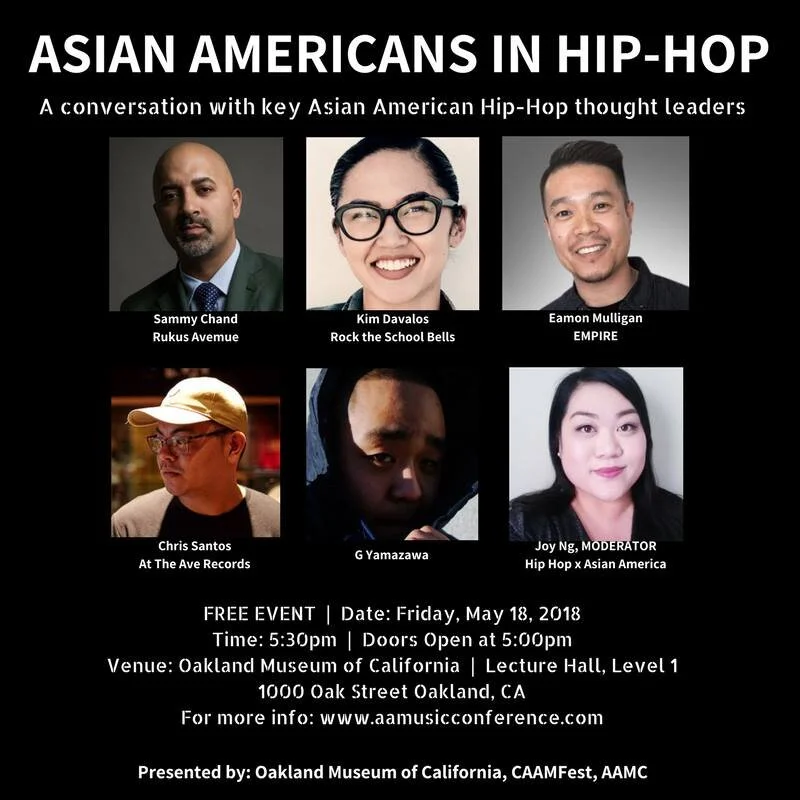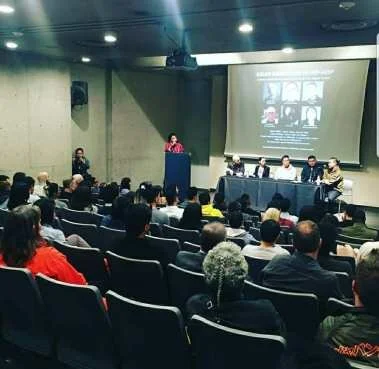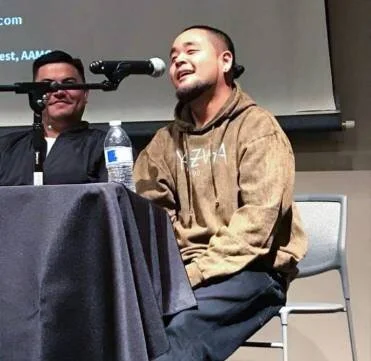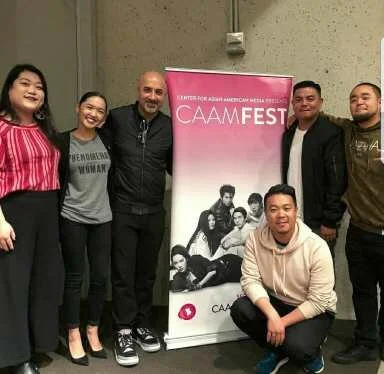Asian Americans in Hip Hop: Panel at Oakland Museum of CA
For Asian Pacific American Heritage Month, I had the pleasure of moderating a panel discussion on Asian Americans in Hip Hop at the Oakland Museum of California, building onto the highly revered exhibit, RESPECT: Hip-Hop Style & Wisdom. The panel— presented by CAAMFest36, co-presented and curated by the team at Asian American Music Conference, took place at the Oakland Museum of California— sought to highlight a diverse handful of individuals who are actively engaged in Hip Hop culture. Our panelists included:
Sammy Chand, CEO of Rukus Avenue Music Group
Kim Davalos, Poet; Coordinator of Rock the School Bells
Eamon Mulligan, Director of Product Marketing & E-Commerce of EMPIRE, and Manager of The Grouch & Eligh
Chris Santos aka DJ Flow, DJ and Producer of At the Ave Records
G Yamazawa, National Recording Artist & Poet
The first thing I’d like to acknowledge is that I do not pretend to have all the answers; I let my curiosity take the wheel as a Hip Hop head and as a researcher, in search of stories, social justice, and pushes for change at the intersection of Hip Hop and Asian America. This search deepened throughout my research in academia, independent research, and throughout my personal involvement with artists, and within the local community. The second thing I’d like to ground is that this panel is a small sample size of Asian Americans, and of Asian Americans in Hip Hop; we are artists, educators, creators, performers, survivors, and entrepreneurs, and that’s not to say all of us fit every description either. None of us can speak for everyone, but what we can do, is speak our truths from our personal experiences.
Through this panel, we strived to highlight different roles of Asian Americans in Hip Hop: through Asian American rap and artistry, through the classroom with Hip Hop pedagogy, and through entrepreneurship as well.
Kicking off the discussion at OMCA
As a writer and logistics person, rarely am I handed the microphone. I spent a few weeks preparing with Asian American Music Conference’s Christina Luna, to form questions around the experiences of the panelists, and questions in the interests of our audience. On the way to the Oakland Museum, I wanted to rehearse the questions in my head, but my Lyft driver was quite talkative. I entertained him. He asked what was going on at the Museum. I tell him about the panel. What are the chances that the driver says he hasn’t listened to Hip Hop, and then asks, “What IS Hip Hop?” I spend a majority of my waking life navigating this question, and I could not help but thank the universe for this unexpected warm-up for the panel discussion. In a That’s-So-Raven moment, my brain zipped through a 0.5 second-slideshow of Hip Hop history, resistance, music, radio, race, industry, and so many other things. The only answer I could offer my Lyft driver was that Hip Hop isn’t just music, it’s a culture that provides a language and a vehicle to share a message for the people.
Left to right: Joy Ng, Sammy Chand, Kim Davalos
With a brief introduction from CAAM and from Asian American Music Conference, we introduced the panelists, sped past formalities and jumped right in. Along with some individual questions, we dove right into the difficult questions surrounding race, and continued onto education, working in the industry, tips for independent artists and branding, and visions for the future of Asian Americans in Hip Hop:
What’s your relationship with Hip Hop as Asian American and how does that impact your career path?
There have been important conversations around the role of Asian Americans within Hip Hop, as a genre of Black music, and especially around the question of appropriation. Do you think the right questions are being asked? What are your thoughts?
With the accessibility of digital tools and social media, we’re seeing a lot of DIY marketing and branding. What advice or insight do you have for artists who are building their brands?
What do you envision for Hip Hop in the future?
G Yamazawa
Although we came prepared with questions, the answers were far from simple; their responses to each other were layered and complex. The conversation amongst the panelists represented a spectrum of different Asian American experiences, skills, beliefs, politics, and visions. They weren’t afraid to disagree with each other. This discussion was nowhere near monolithic or sugar coated or individualistic; while carrying many differences, they all leaned towards underlying themes of communal effort towards positive change, and emphasized importance in understanding knowledge of self and maintaining authenticity.
From left to right: Joy Ng, Kim Davalos, Sammy Chand, Eamon Mulligan, Chris Santos, G Yamazawa
This event reached maximum capacity and was forced to turn attendees away. Gauging from the responses of the audience, which comprised of Bay Area independent artists, educators, social justice advocates, writers, content creators, Hip Hop enthusiasts and local community members, there is a strong interest and need for more conversations around Asian Americans in Hip Hop. There is a thirst for spaces where we can come together to learn from each other, talk about our art, learn to survive the business, take notes, ask the difficult questions, and do so without shying away from complexities of the personal and the political.
Keep your eyes on the upcoming Asian American Music Conference, November 10th.
Website: http://www.aamusicconference.com/
Instagram: @aamconference
Peep the panelists’ work:
Sammy Chand | Rukus Avenue
Kim Davalos | kimdavalos.com
Eamon Mulligan | EMPIRE
Chris Santos | At the Ave Records
G Yamazawa | gyamazawa.com
Related Press:
SF Weekly | “G Yamazawa, Durham Bull“
All my gratitude to Christina Luna and her team from Asian American Music Conference & Luna Co. for the opportunity, their prep work behind the scenes, and all the support during the event!




